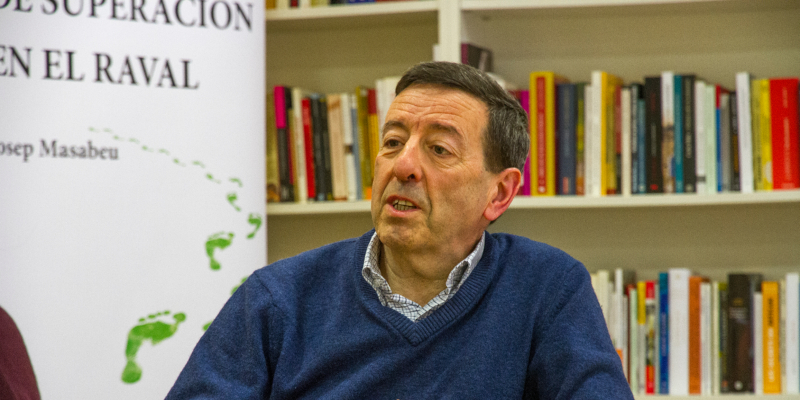Josep Masabeu is president of the Braval Foundation, a development and promotion initiative located in Barcelona's Raval neighborhood.
Text - Fernando Serrano
Josep Masabeu has a doctorate in pedagogy and has always worked in the educational world, in the area of local administration, in historical research, in the field of youth leisure and solidarity. It can be said that his whole life has been marked by others, from different fields and positions.
Since 2009, he has chaired Braval, a development and promotion initiative located in the Raval neighborhood of Barcelona. This foundation seeks, through volunteering, to promote the social cohesion of young people and facilitate the incorporation of these adolescents into society. More than a thousand participants from 30 countries, speaking 10 languages and professing 9 different religions, have worked on this solidarity project.
We eliminate barriers
Within this mosaic that is the Raval neighborhood, where more than 49,000 people live in 1 square kilometer (3 times more than the Barcelona average), Masabeu develops his work. El Raval is a peculiar neighborhood, not only because 50 % of its inhabitants are foreigners, but also because, as he himself points out, "it's a very special neighborhood.the neighborhood has a large social network that provides hospitality and cohesion, which prevents the emergence of outbreaks of violence".
"Suppose we are in a castellet. When you are on the base, next to a Pakistani and a Congolese, there is no physical barrier.", explains Masabeu. "The physical barrier leads to a mental barrier. When I see that you are from another country, culture, color... I don't know what to say to you and you don't know what to say to me. It is necessary to create spaces to live together.s".
As Josep points out, stereotypes exist in all cultures and societies, but they are almost always false. As an example, he tells us about a situation that occurs in the capital city of Barcelona. "There are 12,000 Pakistanis in Barcelona. Of the 12,000, 6,000 have library cards. You go to the neighborhood library, you go in there in the afternoon and you have the feeling of being in a Pakistani city. You start talking to the people and it breaks your mind, because it turns out that they are consulting their country's newspapers on the Internet.
You also find that they have a university degree and are working in construction. It breaks many schemes, but to break these prejudices, you have to play, to mingle.".
If anyone is an expert in this field, it is Josep Masabeu. "I have always liked this world, the world of teaching and social work. I have a doctorate in pedagogy, I worked for 27 years in a school in Girona, from there I did many work camps with adolescents all over Europe.".
The origin of Braval
The origin of all that the Braval Foundation stands for can be found in a church in the neighborhood. "All this began in the church of Montealegre. From there we provided pastoral care and also primary family assistance: food, clothing, medicine, accompaniment....". The late 1990s was when the neighborhood underwent a demographic and social change. "In 1998 immigration exploded. When in Spain the percentage of immigrants was 1 %, in the Raval neighborhood we were at 10 %. Within months the neighborhood went from being an area with mostly elderly inhabitants to a neighborhood of immigrant families and streets full of children. The schools were overflowing".
To carry out the Braval Foundation's challenge, Josep Masabeu visited social care centers and foundations in the United States and the United Kingdom. "We went to the United States and England to see immigration centers, to learn, because we did not know what to do. From these trips we saw that we had to support ourselves in several points: we have to create spaces for coexistence, we have to continue with primary family care, school success and labor insertion are fundamental.". On this scheme, the foundation was created to carry out this work and the first multiethnic soccer teams were created, subsequently the work of school reinforcement, basic language, occupational, young talent, families, summer camp and volunteer training was carried out. According to Masabeu, "collective sport is the means we use to facilitate coexistence, and it is the resource to motivate them to study and assume the behavioral patterns of our society.".











